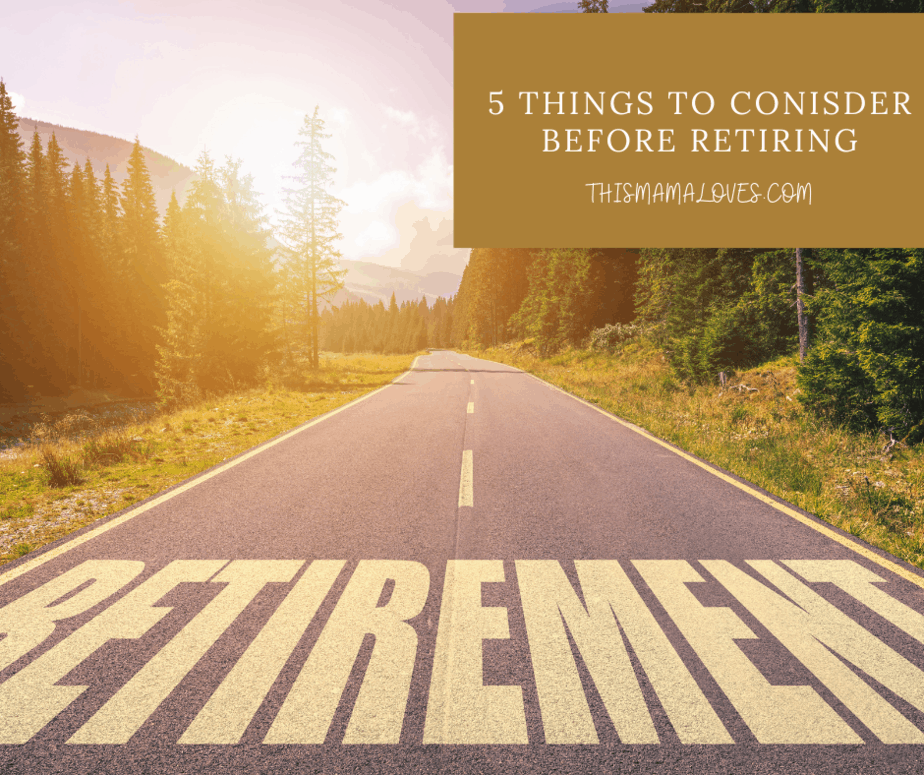After years of hard work and dedication, you may have begun to consider retirement. However, with the COVID-19 pandemic leading us into a global recession, you may be worried about the consequences of retiring during such a tumultuous time or feel as though you need to work a few more years in order to be able to provide for yourself and your family.
Despite this, you should ensure that you do not work more than you are able. After years of service, you deserve a relaxing, stress-free retirement. Retiring means you can focus on yourself, your health, and your family. All of which are more important than earning a few more dollars. Nevertheless, here are some things you should consider before retiring from a guest author.

Photo by Jason Briscoe on Unsplash
5 Things To Conisder Before Retiring

1: Do you have control over your finances?
Before retirement, you should ensure that your finances are in control. Though you may be receiving money through a pension and workplace scheme, you must have some savings set aside, too. Therefore, you should ensure that you have complete control over your personal finances. You should understand everything you need to pay for now and moving forward. If possible, you should ensure that you have repaid your mortgage or downsize. This removes the financial burden associated with paying off your mortgage and means you can focus on rest and relaxation. Furthermore, being in control of your finances means you are well prepared for anything life might throw your way – such as unexpected medical costs.

Photo by Josh Appel on Unsplash
2: Does taking a lump sum from my pension make sense?
Each and every one of us will have a different retirement plan. For example, you may prefer to receive your retirement fund in monthly deposits, to stop overspending and ensure that you have enough money to stay afloat. However, others may prefer to receive their pension in a singular, lump sum. This makes sense if you are not particularly worried about receiving money each month. It also means you have easier access to your funds, and you are able to invest should you wish to.

Photo by James Hose Jr on Unsplash
3: How will I spend my time?
As you transition into retirement, you’ll likely have a lot more free time on your hands. However, it is important that you make the most of this time, instead of sitting around. While relaxation is necessary, you should also ensure that you have plenty of things to do to keep you busy. This is a great way to fight boredom, monotony, or restlessness. For example, you could choose to pick up a new hobby or go traveling. Challenge yourself to do something you have never done before – especially something you have always saved for a later day.
When putting together your plans, ensure you also consider fitness. While you don’t have to run a weekly marathon, you need to keep moving into retirement. Try to go for a walk each morning or stretch in the evening – whatever exercise works for you.

Photo by Matteo Vistocco on Unsplash
4: What is your plan for health insurance?
As you get older, you need to make sure you have the appropriate health insurance for your needs. This can help protect you and your family financially should the worst happen, but it can also make it easier to afford doctor’s visits and any medicines you may need. Take the time to browse through all available plans and make an informed decision regarding which plan is best for you. Remember, without insurance, even a simple visit to the doctors can cost you greatly.

Photo by Aaron Burden on Unsplash
5: Will you gradually decrease your workload or stop working at once?
Sometimes, when a person is ready to retire, they want to do it all at once. However, this can be a big culture shock, particularly if you are moving from working five days a week to having no work-related responsibilities overnight. Therefore, it may be beneficial to phase into retirement slowly. For example, you can begin by cutting back your daily hours or start working just three days a week. This gives you a chance to finish any projects you are working on, train any replacement staff, and say goodbye to your colleagues. It can also make the retirement process a little easier as you’ll know what to expect when you retire. This process may be useful if you don’t want to retire fully, but know that you can no longer work as much as you used to.
Remember, no matter what, it is important that you do not overload yourself. Retirement should be exciting, not stressful. Make the most of it!